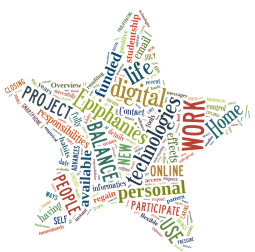This post was originally posted on Marieke Guy’s blog Ramblings of a Remote Worker, in June 2013…
An epiphany (from the ancient Greek ἐπιφάνεια, epiphaneia, “manifestation”) is an experience of sudden and striking realization. Generally the term is used to describe scientific breakthrough, religious or philosophical discoveries, but it can apply in any situation in which an enlightening realization allows a problem or situation to be understood from a new and deeper perspective ( Wikipedia ).
I think we’ve all had an epiphany at some point or other – and many of us have had this moment of understanding about the environment we are working in. I think for me the last 5 years of working from home have allowed me many different insights into how we work as individuals and in teams, and our relationship with technology.
A new project called Digital Epiphanies is exploring the (many) roles of ICT in the context of ‘work-life balance’. It is a Digital Economy programme funded project (via EPSRC) under the broad heading of ‘Achieving Work-life balance in a digitally dependent world’, which is seen as a challenge area of ‘Sustainable Society’.
“The advances in technology in recent years have had many positive effects on the ways in which people can combine work and personal life. For example, being able to access email via a smartphone means that many can work from home, or work a flexible work pattern that successfully fits around caring responsibilities. However, the resulting “always-online” culture in which people expect almost instant responses to email messages, brings stresses and strains to those who feel under pressure to respond immediately and be available on a 24/7 basis….Despite widespread and proliferating debates about the impacts of digital technologies on work-life balance, few empirical studies have explored how these technologies are being used and what impact their use is having on people’s work and personal lives. This project seeks to enhance our understanding of the paradoxical and double-edged effects that new technologies and digital practices are having on work-life balance through two central objectives.”
So far the project has produced two useful publications:
- Zhou, Y., Bird, J., Cox, A. L. and Brumby, D. (2013) Estimating Usage Can Reduce the Stress of Social Networking. Personal Informatics Workshop (CHI’13) PDF
- Stawarz, K., Cox, A. L., Bird, J. and Benedyk, R. (2013) “I’d Sit at Home and Do Work Emails”: How Tablets Affect the Work-Life Balance of Office Workers. CHI Extended Abstracts 2013, 1383-1388. PDF
A former colleague of mine – Paul Shabajee, who I worked with on Greening Events, is one of the researchers, and I’m going to be interviewed for the project. The interview is in part about the roles of technology but also will aim to identify wider factors that play a role – from individual to global scales, with the medium term goal of identifying potentially positive roles for digital technologies at the various levels.
I’m thrilled to be able to help with this exciting and ground breaking project and will let you know about the outcomes.
Marieke Guy




